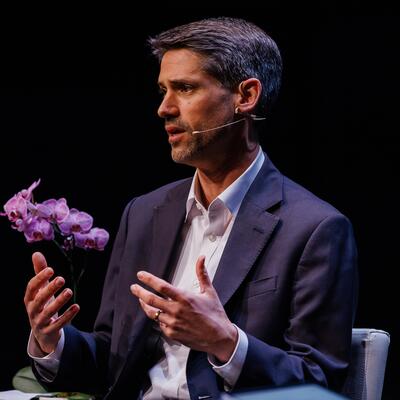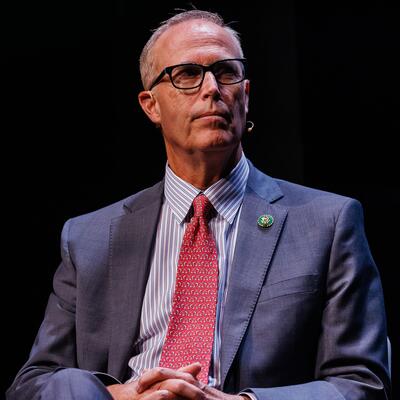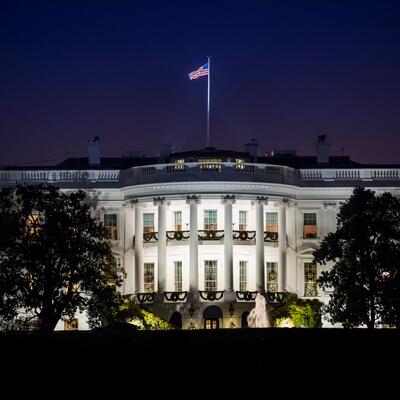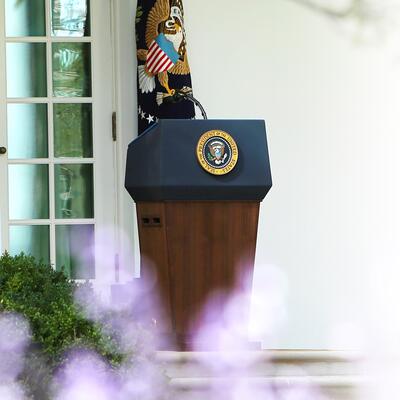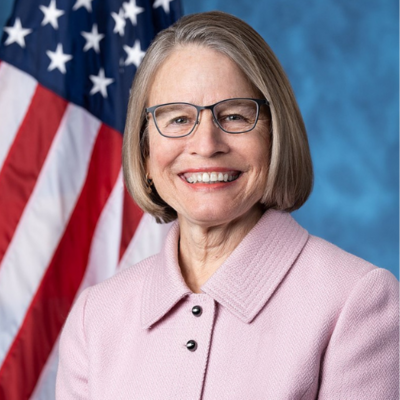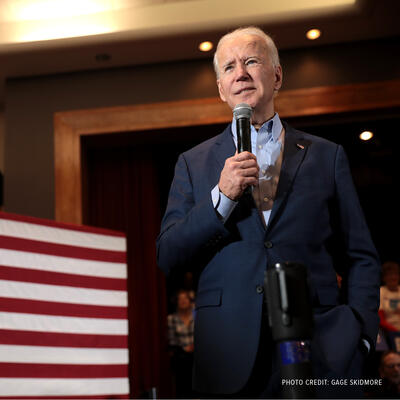
Biden’s Climate Opportunity (Part 2)
Guests
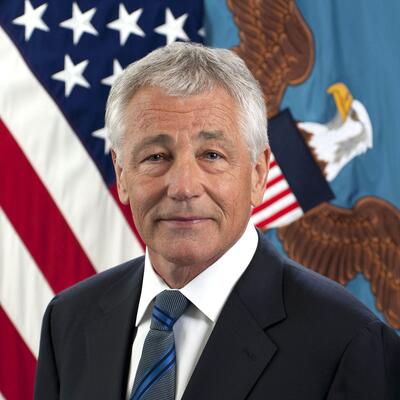
Chuck Hagel
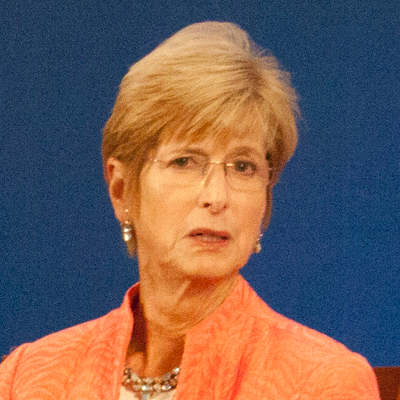
Christine Todd Whitman
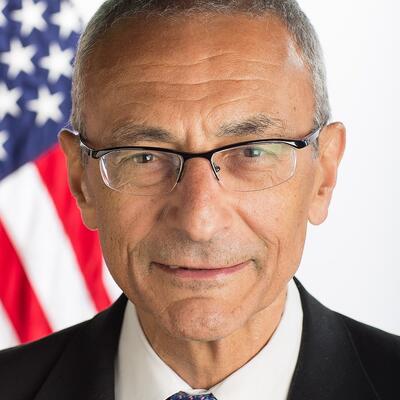
John Podesta
Summary
Can President Biden bring the country back together - and move it forward?
Former U.S. Secretary of Defense Chuck Hagel believes he can. “I think if there was ever the right kind of leader at the right time for this country, it’s Joe Biden,” Hagel says. “I know this guy very well… his judgment is good, his experience is good and his appeal to the other party is reaching across the aisle.”
Hagel, who as a Republican Senator from Nebraska served two terms with Biden, recalls a time when the Senate was a more collegial place. “You worked with other guys and other people, you respected them. You fought like hell for what you thought was right and your philosophy but in the end you came together…you moved the country forward.
That’s Biden’s style, Hagel continues. “And that isn’t gonna fix everything, of course not -- he’s got an agenda of immense challenges and problems. But if you start with that …there are enough Republicans in the Senate who will respond to that.”
Nevertheless, advancing a bipartisan climate agenda will be a hard sell. One way to sweeten the pot? Make it all about the economy. With an emphasis on jobs, jobs, jobs.
John Podesta, who heads up the Center for American Progress, thinks Biden’s design for a green economy has the potential to bring the whole country along. “Different places have different resources when it comes to the wind, the sun, geothermal, etc.,” Podesta points out. “I think there's a place for everybody across the country in this -- and that's the story we need to sell.”
Biden’s proposed cabinet picks reflect his belief that everything from public health to racial injustice to the economy hinges on climate. And he’s already made some historic choices. If confirmed, New Mexico representative Deb Haaland will be the first Native American to head up the Department of the Interior. And Michael Regan is in line to be the first Black man to lead the Environmental Protection Agency.
Former New Jersey Governor Christine Todd Whitman, a former EPA Administrator under George W. Bush, says the new head of the EPA must act immediately to undo the damage done to the agency by the previous administration.
“One of the first things they ought to do,” Whitman suggests, “is…go to the various entities within the division of water, the division of air, each and every one of those, and to tell them that science matters now. That EPA is back on track to protect human health and the environment.”
Related Links:
Revamping Federal Climate Science (Center for American Progress)
What could Biden’s climate cabinet realistically accomplish? (Grist)
Historic picks for EPA, Interior complete Biden climate team (Scienific American)
Progressives gear up for broad new push on climate action (NPR)
Full Transcript
Greg Dalton: This is Climate One. I’m Greg Dalton.
As Joe Biden takes the oath of office, the nation is waiting to see what he will do about the capitol riot, the pandemic and the economy. That’s not all:
Christine Todd Whitman: This...President-elect has shown that he is absolutely committed to addressing the issue of climate because it affects everything.[:07]
Greg Dalton: Advancing a bipartisan climate agenda will be a hard sell. But in his nearly four decades in the Senate, Biden made friends and earned respect from his Republican peers.
Chuck Hagel: That isn’t gonna fix everything, of course not...but if you start with that...there are enough Republicans in the Senate who will respond to that. [:11]
Greg Dalton: One way to sweeten the pot? Make it all about the economy. With an emphasis on jobs, jobs, jobs.
John Podesta: Different places have, you know, different resources when it comes to the wind, the sun, geothermal, etc...I think there's a place for everybody across the country in this and that's the story we need to sell. [:13]
Greg Dalton: Biden’s climate opportunity - part two. Up next on Climate One.
---
Greg Dalton: Can President Biden bring the country back together - and move it forward?
Climate One conversations feature all aspects of the climate emergency: the individual and the systemic, the exciting and the scary. I’m Greg Dalton.
Greg Dalton: Democratic control of the incoming US Senate increases the odds that President Biden can assemble the team he wants to pursue his climate agenda. And not a moment too soon. John Podesta of the Center for American Progress says the time for incremental steps is past - we need bold, holistic action.
John Podesta: We’re gonna have to say, what are we doing about cars? What are we doing about planes? What are we doing about ships? What are we doing about the power sector? And we’re gonna have to be all in on making change happen in those sectors. [:12]
Greg Dalton: We’ll speak with Podesta later in the program. But first - former New Jersey Governor Christine Todd Whitman, head of the Environmental Protection Agency under President George W. Bush. She believes the new EPA Administrator, Michael Regan, should waste no time when it comes to undoing the damage done by the previous administration.
Christine Todd Whitman: One of the first things they ought to do is...go to the various entities within; the division of water, the division of air, each and every one of those, and to tell them that science matters now, that EPA is back on track to protect human health and the environment. [:15]
Whitman joins me now, along with Chuck Hagel, former Republican US Senator and Secretary of Defense under President Obama. Both Whitman and Hagel are board members of the American Security Project, a centrist group of senior government officials, military officers and business executives.
When we spoke this week, the nation was still reeling from the violent assault on the nation’s capital, by Trump supporters who were attempting to prevent Congress from certifying the election of Joe Biden and Kamala Harris. As a Vietnam veteran and a two-term Republican senator from Nebraska, Hagel has strong opinions about the events that transpired that day.
PROGRAM PART 1: Christine Todd Whitman/Chuck Hagel
Chuck Hagel: Well, I think every American believes what they saw last week was disgraceful, was shameful. As to what should be the consequences of those who perpetrated this and who took part in this insurrection and invasion and destruction to the capitol, there should be severe consequences. Certainly, those who participated and who crashed into the capitol and did violence to other people. As you know five people lost their lives during this time, but also those who are responsible for inciting it. And I have to say I think that includes the President of the United States. I'm very sad to say that as an American who has served this country and had the privilege of serving this country in many capacities to have to say that the President of the United States was involved in the insurrection of what we saw last week in our nation’s capitol. He needs to be held accountable. Just as those who invaded and did damage to our capitol.
Greg Dalton: If you were in the Senate today, would you vote to remove him from office?
Chuck Hagel: I would.
Greg Dalton: And how about your former colleagues, Ted Cruz, I don’t think Josh Hawley was in the Senate when you were there. What about senators who supported this?
Chuck Hagel: I can't think of a more irresponsible act that could have been done by any of my colleagues. I've never seen a more irresponsible act by any of my colleagues when I was in the Senate as this. To witness what they witnessed they were there, they underwent all the protections that Capitol Hills police gave him and whisking him off the Senate floor, they saw it they were right there. But still carry forward their preposterous notions and what the president has talked about since the election actually before the election that the election was fraudulent and was stolen when there is no evidence whatsoever, 60 lawsuits were thrown out by courts at every level two of them by the Supreme Court to show that there was nothing to it. But yet they went forward to ingratiate themselves with the Trump political base. I suspect looking at their own political interest in being a Republican presidential candidate in 2024. I don't ever ascribe motives to people but it seems to me that has to be pretty clear as a motive as to why they did it because there is no evidence to show that anything was fraudulent in this election.
Greg Dalton: Governor Whitman, you worked for Donald Rumsfeld during the Nixon administration and had been recently kind of estranged from your party. You praise Lisa Murkowski, Mitt Romney, Maryland Governor Larry Hogan, who you see now who are voices of conviction and courage on the Republican Party?
Christine Todd Whitman: Well, those were be the ones I’d start with without question. I mean, it’s unfortunately Mitt Romney has been very quiet. He was quiet on the sixth he’s been quiet since. Lisa Murkowski is the one that stood up and said things. There are number of the senators who did get the message from what happened on the sixth because when you started the process of counting the electoral ballots there were 14 senators that were going to object after the riots after they got back to doing it. They were six maybe seven who still objected and I agree with Secretary Hagel they should face the same kind of punishment that the president should face but probably that will be in the ballot box, and then it will be up to us to remind people of what this has led to because we’re gonna see more of this.
There are Republicans who got the message. There are Republicans who never were on that side. They will be hopefully the leaders there's the problem solvers caucus in both houses where you have an equal number of Republicans and Democrats who have worked together and will continue to work together and with the Congress being as close as it is in both houses. I think you're going to see that they are going to have more influence than before and that's good and hopefully enough of the rest of them were shaken up enough by what happened and their part in it, and how they lived through it. That they will step back and recognize that we got big problems in this country with the coronavirus, which I would argue is climate related and until we get that under control, we can't get the economy growing back to where it needs to go. So, there’s a lot of work to be done and both sides should be able to agree that those are issues that need to be addressed and then start moving forward on them.
Greg Dalton: Governor Whitman. Joe Biden and Kamala Harris will soon be inaugurated. How will the riot at the capital impact their ability to get serious about the pandemic, the economy, and restart efforts to confront climate change?
Christine Todd Whitman: Well, I think the big challenge is gonna be those still 50 million people who believe this election was stolen because Trump’s very strong base is not gonna go away. And they are going to keep pressure on their elected representatives not to be helpful not to work across the aisle not to enable Joe Biden to get this country back on track. Having said that, I also think that there are enough members on both sides of the isle who recognize that this pandemic is an enormous issue that we have got to solve. And people are losing their lives as well as their livelihoods and their homes and they’re scared and they should be. Right now, I'm in Arizona which is the number one state for infections and I still see people that want to go out and want to party want to go to restaurants and things. When you say are you out of your mind? It’s just for this period of time we've all got to work together. But you're gonna see Joe Biden said he wants to have that first hundred days wear a mask. You’re gonna see a lot of those Trump supporters who will not do that. They just won't do it. They're still fighting the Trump war and they will continue to do it. So that's gonna make it a little more difficult for those members on the hill, but I still think there are enough who’ve shaken by what happened on the sixth will probably be shaken by whatever occurs over the next few days up until the 20th who recognize that this is a problem we’ve gotta get on top of it gonna get the economy growing again and that's the major issue we have to face.
Greg Dalton: Secretary Hagel, you and Joe Biden left the Senate at the same time 12 years ago when it was as Governor Whitman noted, a much more collegial institution. Joe Biden praised Mitch McConnell's speech after the riot. Do you think Joe Biden and Mitch McConnell can revive some of that collegiality and cut some big deals?
Chuck Hagel: First of all, I think if there was ever the right kind of leader at the right time this country is Joe Biden. I know this guy very well. I've been all over the world with him, been in all kinds of situations with him, worked closely with him for 20 years. And I know what he's about. He’s like all of us; he’s human. He makes mistakes. We all make mistakes. But he has a core decency to him. That is the beginning of everything.
His priorities will be right. He's been around a long time. His judgment is good his experience is good and his appeal to the other party is reaching across the aisle as Governor Whitman noted. When I was in the Senate that’s where you did it, I mean you worked with other guys and other people, you respected them. You fought like hell for what you thought was right and your philosophy but in the end you came together. You made it work. You moved the country forward. You compromise. I know that's a terrible word today, compromise, but that's the way democracies work. And there's only one alternative to that and that is anarchy and authoritarianism. And you don't want that I hope there’s enough people in this country who don't want that option. But his relationship with McConnell is a good one. I've seen it close up for 12 years longer than that. They got along in the Senate they work together in the Senate. They both respect the institution. They both have their own approach and philosophy about things. But that's an important quality I think a very important quality that Biden brings to this job. His style is to reach across the aisle. His style is to bring in the other side.
To give you quick a story about Joe Biden. The first meeting of the Senate Foreign Relations Committee in January of 1997, I was elected 1996. There were two freshmen Republicans that came on the committee. Myself and Sen. Gordon Smith from Oregon. And we were seated over on the Republican side of the dais before Jesse Helms was chairman, Biden was a ranking Democrat before the meeting started and all the senators were there, Democrats, Republicans. And Joe Biden got up and walked around Jesse Helms and came over to the Republican side, put his arms on Smith and arm on me and he said, welcome to the Senate Foreign Relations Committee, we’ll have a lot of fun, we’re gonna do a lot of work. I know we’re gonna have some disagreements but I just can't tell you how glad we are to have both of you here and if there's anything I can do to help you guys. That’s Joe Biden.
And that isn’t gonna fix everything of course not. But he's got an agenda of immense challenges and problems but if you start with that and as Governor Whitman said earlier there are enough Republicans in the Senate who will respond to that. Let's move the country forward. Let's fix the problems we start with COVID and everything that's associated and the consequences of COVID had on our economy on issues like climate. So, I’m optimistic with all the problems we got I'm still optimistic.
Greg Dalton: My guests today are Chuck Hagel, former Republican Senator from Nebraska and Secretary of Defense under Pres. Obama. And Christine Todd Whitman, former Governor of New Jersey who led the U.S. EPA under the second President Bush. They’re both board members of the American Security Project, a centrist group of senior government officials, military officers and business executives. Later in the program we’ll hear from former White House Chief of Staff John Podesta.
Greg Dalton: Governor Whitman, you tweeted that people will die because of an EPA rule that limits the use of scientific studies in crafting public health rule. We’ve seen the destruction of half a century of environmental productions. What it’s gonna take to restore the health of the U.S. EPA, and when you think of Biden's nominee to run the agency Michael Regan?
Christine Todd Whitman: Well, probably the only person I don't know personally that he has tapped to be involved with the environment and with climate change is the incoming administrator of EPA. I do not know him personally, but clearly his record is one of someone who believes in the issue who understands the mission of the agency, which is simply to protect public health and the environment that's really all it's about. Obviously, what has to happen is you have to start to rebuild the budget because it's been shorn year after year, particularly by this administration. You have to, the incoming EPA administrator has to really I think one of the first things they ought to do is go have all hands meetings and then go to the various entities within the division of water, the division of air each and every one of those and to tell them that science matters now that EPA is back on track to protect human health and the environment that's what it's about that's what he's committed to doing. And then with the number all the things that President-elect Biden has said all the people that he’s appointed and their commitment to these various issues. Science is once again going to become important.
And that's where we really have to rebuild as part of the institutional undermining that this president has done. As he’s not only undermined the public's confidence in any part of government but particularly with the scientists. And we saw it with the coronavirus I mean, we are where we are today because this administration wouldn't take it seriously wouldn't listen to the scientists. And they kept denigrating the scientists and pushing them off to the side. Particularly with the issue of climate that this administration has stopped and the scientists all across the government not just at EPA from attending conferences where climate change might be mentioned. They're not allowed to talk about climate change. To have NOAA be told that they cannot factor in the impact of global warming on the seas as they try to project out the storm seasons is mindless. We know that when the water heat as they have in our oceans that that impacts climate and that impacts the frequency and severity of the storms that we've been seeing. And fortunately, the general public gets it I mean better than 50% of Americans and better than 50% of Republicans recognize that the climate is changing it’s having a bad impact and that we need and can do something about it. And it's going to take that kind of commitment, but we have it finally, from the top and it's the administrator the new administrator has to be constant in pounding that message that we believe in science that we are going to ensure that we are protective of human health and the environment because that's the job of the agency.
---
Greg Dalton: You're listening to a conversation about moving the Biden climate agenda forward. Coming up - rejoining the Paris Agreement - if they’ll let us back in.
Christine Todd Whitman: Right now, our allies, all those who signed it, they’re looking at us and say look, you guys negotiated this, we made changes in order to accommodate what you thought was important and then you walk away from it. How can we trust you again? [:12]
Greg Dalton: That’s up next, when Climate One continues.
---
Greg Dalton: This is Climate One. I’m Greg Dalton. We’re talking about Biden’s climate opportunities, with former Defense Secretary Chuck Hagel and former EPA Administrator Christine Todd Whitman.
President Biden may face Republican opposition to his climate plan, but Whitman thinks that when it comes to bipartisan support, there could be some low-hanging fruit.
PROGRAM PART 2 - Christine Todd Whitman/Chuck Hagel
Christine Todd Whitman: Infrastructure is gonna be the easiest of those. But this administration and this President-elect has shown that he is absolutely committed to addressing the issue of climate because it affects everything it affects infrastructure where are you gonna build, how do you build that infrastructure? What do you do with states like mine and New Jersey that are coastal states and what do you rebuild that’s close to the oceans? Because you know what that's not gonna be the same in another few years it's gonna change. And how you build, how you redo your infrastructure is going to be impacted by how climate might change things around that wherever that infrastructure is.
So, it's gonna be a challenge it’s gonna be harder to get people together on it. But one of the things we have to do is we have to take some concrete steps here in the United States that address the issue that show that we’re serious about it. I mean, I agree getting back in the Paris climate accord is going to be important and the administration has shown it is going to do that the new incoming administration they're gonna do that and that's all well and good. But right now, our allies, all those who are signed they’re looking at us and say look, you guys negotiated this we make changes in order to accommodate what you thought was important and then you walk away from it. How can we trust you again? So until we take some steps around whether it's around energy and putting real money into more renewable energy more research and development on that whatever those steps are we need to do a couple things that are gonna be difficult to get done probably but we need to do them here before the rest of the world really takes us seriously and will negotiate with us in the same way that they did before. I mean they need us still; they want us, they want us at the table. We’re still gonna be important, don’t get me wrong but there's a skepticism that is there because of our past behavior. The way we've gotten people right up to the trough to drink the water and then we back away. So, and I do think that one of the things that’s going to be important, is that they see some real signal here however it's done, whether it's a change in the way that the federal government itself contracts how important it puts climate change into the various contracts energy conservation, water conservation whatever they do, but we need to take some hard-core steps here in order to really get us back to a place where we can have the kind of influence that we had before internationally.
Greg Dalton: Secretary Hagel, reporter Abrahm Lustgarten recently wrote an alarming story the New York Times Magazine titled, How Russia Wins the Climate Crisis. The article says warmer temperatures will increase Russia's agricultural production and transform Siberia into a more hospitable and productive region. John McCain once famously said Russia is a mob on gas station. Do you agree that a global economy based on fossil fuels, and this chaos we’ve seen benefits Russia?
Chuck Hagel: Well, no question about it. If that's where we were going if that’s where the world was going, but the world is not going in that direction. I don't believe. The reality is we can’t continue in that direction and it benefit Russia clearly if we continue to rely on fossil fuels for everything. But fortunately, we’re not going to go that direction, but it's going to be difficult, as we all know. You know it's interesting and you all know the numbers on this, but I was reading over the weekend some of the results of what the climatologists have said happened in 2020. The northern Siberia the Arctic warmest year in the history of temperature keeping in 2020. The problem that we’re dealing with Putin and with Xi and Kim Jong-un other dictators is that they don't really care about their people, they never have, their future, their quality of life, their health. That everything is affected by climate. It's all about staying in power and selling gasoline and selling oil and doing what they need to do to keep their economy strong. And so, we're different than that Western democracies are different. Civilization is very clearly divided between those two camps. And I think what we need to do in dealing with those international renegades and outcasts who we know a lot about is again what we were talking about here earlier is the power of our example as Joe Biden said not that the example of our power, but the power of our example. And the work with our allies and he's going to have an immense job, Biden is, to rebuild those alliances those structures those allies those partnerships those friends. And we've always needed those allies. I think we need allies in the world today and international institutions more than maybe anytime because if nothing else the problems are more complex. We got 7 billion people on the face of the earth. Demographers tell us we may have 2 billion more by 2050. That's just unbelievable to think of if we don't deal with climate first in dealing with all of these issues, the droughts, the health issues the falling of governments of economies. I mean all the consequences are gonna come from this are so severe.
So, we've got all these things that we have to assimilate and bring together and work together as we lead. But it all starts with leadership it starts with example. It starts with working together as Biden has said, and I watched him do it for over 20 years. That's where we’re most successful this country when we work together with our allies, our alliances and that's based on common interest. All those institutions that we help build lead after World War II and building a liberal world order. They were based on one thing, common interests. All those institutions couldn't fix everything. United Nations couldn't fix everything, but it brought countries and people together to try to fix problems that are common to all of this. And we still have our sovereign nations. We still have to work through differences. So, I think you've got to come at it from that perspective, the whole.
Greg Dalton: So, Governor Whitman, you know, as we look forward at, you know, climate is such a long-term difficult issue with our democracy is kind of crumbling. Where do we go from here? How do you see the, what’s your optimistic look at the future?
Christine Todd Whitman: I wouldn’t say democracy is crumbling. I'd say it's been very severely challenged and we have seen some of the weaknesses that we have in our system and those can be addressed. I cochaired a task force on the Rule of Law & Democracy with Preet Bharara at the Brennan Center, NYU. And we put out two reports with our committee and Secretary Hagel was part of that. And we made a lot of recommendations of actions that can be taken early on by the Congress, laws that can be passed things that for instance that you couldn’t fire a special prosecutor or an inspector general without cause. That every presidential candidate and vice-presidential candidate has to disclose their tax for five years before. A lot of steps like that as well as procedural steps within the Congress so that incoming members and younger so that basically so leadership doesn’t have quite the power that they have today to prevent things from being brought up on the floor, no matter how popular they seem to be if leadership doesn't like it.
But, you know, our democracy is strong we saw the votes finally being counted and we know that Joe Biden and Kamala Harris will be the new president and vice president and that ushers in a whole different era for the country because as the Secretary said, Joe Biden's persona is just so different and his whole commitment is so different. His love of country is so different that that's gonna be a relief in on of itself. And so, there are plenty of actions that can be taken. There are a lot of suggestions out there. There are a lot of groups that are working on it and they will continue to work on it. So, I don't think we’re broken, but it's fragile. And as Benjamin Franklin said when asked what kind of a government, they had given us. He said a Republic if you can keep it. And Abraham Lincoln said that if this and I can’t quote him exactly, but if this mighty experiment is to fall it will be from within. And that should be message to all of us we have a role to play in ensuring that that's not what happens.
=======================
RESET: Transition to John Podesta
Greg Dalton: We’ve been speaking with Christine Todd Whitman, former Republican Governor of New Jersey and EPA Administrator under George W. Bush. And Chuck Hagel, former U.S. Secretary of Defense under Barack Obama and Republican Senator from Nebraska.
Greg Dalton: Joining me now is John Podesta, White House Chief of Staff under President Clinton and an advisor to President Obama. He’s now Chair of the Center for American Progress. We spoke before the assault on the US Capitol. I asked Podesta what he saw as Biden’s top climate priorities.
=====================================
John Podesta: Well look, Biden during the campaign and I think during the transition has made climate central to the economic recovery of the United States. The investments that he's proposed will be essential to transforming the economy from one of dirty energy to one of clean energy. And I think that what he's trying to do is organize his White House to deliver on that and he's putting people in the cabinet agencies who have the ambition and have the desire and have the knowledge and experience to be able to deliver on that.
And the other thing that he did which I think surprised people. In addition to making it central to as I said the economic recovery and central to building a more just and equitable economy. He made it central to the national security posture in the United States by appointing John Kerry to be the special envoy someone with that kind of experience, depth, passion for the issue. To make him a principle on the national security council bringing climate into every discussion or virtually every discussion of our security relationships around the world really means that this is a very climate focused administration. And I think both President-elect Biden and Vice President-elect Harris have been demonstrating that from the, you know, in the campaign but then, from the day after the election.
Greg Dalton: Clearly, President-elect Biden has the most ambitious climate plan that we've ever seen. And it's this whole government approach putting a climate lens on everything. But, you know, I’ve both been in this quite a while, I’d like to remind people that in 1993, President Clinton, when you were serving in the Clinton White House proposed what was essentially a carbon tax. Democrats had a 14-vote majority in the U.S. Senate and an 82-vote advantage in the House. The BTU tax died in part because of coal state Democrats. 2009, President Obama supported a national cap and trade plan to put a price on carbon pollution. Democrats had 58 votes in the Senate and 257 in the House. Large majorities in both chambers. The Climate Bill passed the House and died in the Senate. So, the last two times we’ve seen a new Democratic president come into office saying I want to move on this with large majorities in Congress, it hasn't happened. How is this time different?
John Podesta: So, I think first of all some good news. There was the bill, the omnibus bill that President Trump threatened to veto but then in the end of the day signed, contained some extensions of the clean energy tax credits. It contained a very important provision which will phase down hydrofluorocarbons. For people who don't know what those are, they’re refrigerants that are used across the spectrum of uses from the auto industry to commercial refrigeration to your home refrigeration. They’re very polluting, super polluting and the bill that just passed in a bipartisan manner through the Congress can avoid a half a degree of Celsius global warming by the end of the century. So that's a big deal.
There was an energy title that was the strongest support on a bipartisan basis for clean energy along with other kinds of energy solutions. Some that divide Democrats like carbon capture and sequestration, but there was movement, at least for the first time in a long while. And we saw Republican support for at least parts of that. But going forward, I think the Republicans are still the Congressional Republicans are sort of a lagging indicator. Republican voters I think want to see action. The Fox News poll election day poll said 72% of voters overall that included a majority of Republican voters or at least a plurality of Republican voters wanted to see action on climate. I think as I said, Biden made it a central part of his economic plan and he was rewarded with over 80 million votes.
So, I think we’re at a moment where we have to move forward with aggressive action using all the tools of the presidency including the capacity for executive action, regulatory action, etc. The convening power of the presidency to move industries which are stepping up to make commitments both for 2030 and for mid-century commitments in 2050 to align with Paris. We need mechanisms to hold make those commitments accountable.
So, there's a lot to do. I think the difference between now and ‘93 and quite frankly in 2009 is that the approach is a little bit more disaggregated sector by sector. What are we gonna do in transportation, how we gonna move towards electrification of surface transportation? What are we gonna do in the power sector? How are we gonna essentially keep the promise that Biden made in the campaign to have 100% clean power sector by 2035? There are different tools that one needs to do those tax credits that I mention are an important part of it, but we need more transmission. We need to align incentives so that state and municipal governments can really invest in more clean energy and more efficiency. So, the sector by sector approaches, I think can work, Obama proved that particularly during his implementation of the Recovery Act in 2009. And then the work that he did in the second term to again move these things forward. So, it's a little bit different than ‘93 and 2009. No silver bullet, but a lot of action and a lot more public sentiment for action.
---
Greg Dalton: You're listening to a conversation about fulfilling President Biden’s climate ambitions, with John Podesta, Chair the Center for American Progress.This is Climate One. Coming up, rewriting the narrative on American jobs.
John Podesta: ..not just a story about what we have to give up, but what we can really build? That's the question we ought to be asking. What do we need to build to solve this problem? [:09]
Greg Dalton: That’s up next, when Climate One continues.
---
Greg Dalton: This is Climate One. I’m Greg Dalton. We’re talking about the Biden climate agenda, with John Podesta of the Center for American Progress.
Greg Dalton: Despite Biden’s pledge to be a president for all Americans, the nation today is more divided than ever. As we’ve seen recently, some factions of the Republican party are becoming increasingly radicalized, to the point of contesting the outcome of free and fair elections. Earlier in the program, Chuck Hagel noted Biden’s long-time friendly working relationship with Republican leader Mitch McConnell. But can we hang our climate hopes on that slender thread?
PROGRAM PART 3 - JOHN PODESTA
John Podesta: Look, you know, I’m a little bit skeptical. I've been through it with both Clinton and Obama. That, you know, you’re gonna get some grand deal with Mitch McConnell, you know, he's been a protector of fossil fuel industries during his whole career in the United States Senate. But I think there is room for progress that can’t happen on a bipartisan basis. To give a specific example, I think you can get a pretty green infrastructure bill through this Congress. Certainly, there’s support for that in the House of Representatives. The Democrats passed a very strong bill, $450 billion last summer that was quite green. I think there’s support for some of that in the Senate.
But again, I think you’re gonna have to pick these things off. You’re gonna have to be smart. I think creating a White House climate office under Gina McCarthy's leadership with Ali Zaidi who worked with me in the Obama White House is a very strong start on putting together that whole of government approach. Not even just the whole of government, it’s really the whole of society. How do you bring together the private sector, the financial sector to get this program accelerated so that we can hit that net zero goal that by mid-century that the science is showing we need to do? I mentioned there's stronger support in the public and I think, you know, it bears saying again. The reason for that is partly because of the greater analysis about the really devastating effects of climate change, but the personal experiences that people are having right now, not in 2050, not their grandchildren's experiences, but people are having right now. The fires in the West. The extended hurricane seasons, the most named storms ever in the Atlantic. The devastation in the Gulf. You see it all around the world. Fires in Australia the flooding in East Africa. The, you know, 47 million acres on fire in Siberia. People are experiencing this in real time. They know we got to deal with it. I think they're prepared to see that acceleration of innovation, the potential for job creation to create these new industries that are necessary. I think people can get behind it and it's gonna take a president rather than denying the climate science whose gonna just really lean into it. And I think Joe Biden and Kamala Harris are gonna be prepared to do that.
Greg Dalton: That response is based on the premise that the public majority translates into policy action in Washington. And Jerry Taylor, who was on the right at the conservative think tanks and now is something of a climate evangelist schooled me on the fact that that doesn't always win in American politics. Look at guns, look at the right to choose there’s lots of issues where American public is on a different side than legislators because our politics are kinda broken. So, I guess I’m saying that the public desire for climate action doesn't mean it'll happen.
John Podesta: No. And it’s a question of money and intensity on the other side. And I think that, while you've seen a lot of the American private sectors, you know, kind of stepping up in their own pronouncements and saying that they're making commitments in their own enterprises. You don't see that translated into lobbying on the hill for clean energy policies. Maybe that's beginning to change a little bit.
Greg Dalton: But 10 years ago, there was an organization in Washington that had heavy industrials and oil suppliers, and they were organized and out front in public in support of specific policy. I don't see that now. I see lots of yeah, we’re greening our operations and these kind of comfortable incremental commitments from companies. They don't lobby on it. I don't see the business support for climate action that was there in public and organize 10 years ago.
John Podesta: Yeah, well, I think they're on the wrong side of their customers then and they’re certainly, you know, anybody who's dependent on a younger workforce are on the wrong side of their employees. And I think that there needs to be movement, but there also has to be pressure. And as I said, the money has been stacked on the side of fossil fuel industry. They spent a trillion dollars in 2009, maybe I'm overstating that, they spent a billion dollars in 2009 trying to defeat Waxman-Markey. So, but it's going to take winning the politics of this really. But I think it’s winnable that's my, you know, central point.
Greg Dalton: Well, the bright part approach will be like to win, you got a break American politics. So, there’s politics, our politics are broken. Some of the problem is coal state Democrats some of the leading Democrats are Joe Manchin and Jon Tester, both coal states they’re in powerful positions in the U.S. Senate. So, where do the politics need to break because this incremental action isn't getting us very far.
John Podesta: Yeah, I’m not calling for -- don't get me wrong, Greg. I don't think we can afford incremental action. And I think maybe that's the, you know, if you said where would you get some agreement with Republicans. It would be for something like that incremental action. We can’t afford that. The crisis is upon us the devastation to human security to national security to the economic security of Americans. The differential impact on distressed communities on people of color it's right on us right now. So, we need aggressive action.
What I was really saying is it's probably gonna be sectoral rather than one size fits all solution that says all we need is a, you know, we just need to put a price on carbon it can run through the economy. That's the most efficient way to do it. I think the time for that is probably past. We’re gonna have to say what are we doing about cars. What are we doing about planes? What are we doing about ships? What are we doing about the power sector and we’re gonna have to be all in on making change happen in those sectors at a pace that's consistent with again with the pledges that were made in this campaign: a 100% clean power by 2035, net zero economy by 2050. 40% of the investments going to distressed communities. Those are big promises. We need to deliver on those and that's hardly incremental that's revolutionary in a sense. But it's not wrapped up in just one bill that's going to likely pass Congress and, you know, in the first few months.
One way or the other we need to make those investments and I think the administration has to organize itself to align with states and cities that want to go faster that want to do more. And I think you can see a lot happen over the next couple of years and through the decade of 2030. We need to get about 50% reduction in emissions by 2030, to have any chance of getting to net zero by 2050. One piece of good news though over the weekend there's just some new scientific reports that said, if we can get to net zero, we will stabilize the climate much more rapidly than I think people thought before.
So that within a decade or two decades you’d see at least the climate stabilize. We have to still keep removing carbon dioxide both through natural means, and perhaps through air capture of carbon dioxide through the rest of the century. But that's really good news because before people thought, look, the temperature is gonna keep rising through, you know, really centuries beyond what we’re doing now. The latest scientific information indicates that maybe we can, you know, we could stop the growth in the heat load within a decade or two of getting to net zero.
Greg Dalton: Right. So, the need is bold that is very good scientific news. But, you know, back to the politics, after that ‘93 introduction of a basically a carbon price in ‘94, the Democrats lost the house for the first time in decades with the Contract for America. 2010, after a push on climate, Nancy Pelosi lost the gavel, you know, there’s a very thin margin in the House this time, the Democrats have a favorable field in the Senate in ‘22, but those midterm elections are already looming large and are gonna cause some doubt for moderate Democrats on going bold on climate.
John Podesta: Well look, I think what going bold means is in creating jobs and investing in their communities in creating this cycle of innovation and creating new American businesses and controlling the supply chains for and, you know, again everything from electric vehicles to new sources of supply in appliances and everything else. Those things can be made in America. I think what people want to see is a strong and equitable economy where people can work in decent jobs where you see those jobs being well-paid and if you can deliver on those promises and make this a good news story, not just a story about what we have to give up but what we can really build, that's the question we ought to be asking. What do we need to build to solve this problem?
And I think that with American ingenuity and American commitment, again, the United States can lead the way and that's gonna be good for those districts that are the swing districts where moderate Democrats need to compete to get elected. And including in states that no, they need to transform, you know, I spent a lot of time with Joe Manchin. And I think while you know, I don't think you can count on him for every vote and we’ll have to keep both working with him and pressuring him. He knows that the world is changing, climate change is real. He’s not denying the existence but he wants as he should as a senator from West Virginia, he wants to know that transition in the economy is gonna also help the people in his state. That they’re gonna be able to participate in a positive way in a clean energy future. And I think we can make good on those promises.
Greg Dalton: And that’s Joe Manchin, who once shot a bullet through the cap and trade bill for a campaign ad. As chair of Hillary Clinton's campaign, you surely know that in her memoir she wrote that the campaign mistake she regrets the most is something she said in a CNN town hall. And this is a quote where she said we’re gonna put a lot of coal miners and companies out of work.
Hillary Clinton: I’m the only candidate which has a policy about how to bring economic opportunity using clean, renewable energy as the key, into coal country. Because we’re gonna put a lot of coal miners and coal companies out of business. [:15]
She also made it clear she doesn't want to leave those people behind and that didn't always get as much attention as the quote about putting coal miners and companies out of business. What do the Democrats have to offer to the people who are afraid that a change from fossil fuels will take away their livelihood?
John Podesta: Look, I think it is these technologies, businesses and manufacturing of the future in terms of where we need to be thoughtful about having regional strategies that both cite that work build those localized economies or those regional economies to support the work. That's why I think Biden again in the campaign put such an emphasis on building, not just the finished product, but the supply chains in the United States being leaders across the board. And creating manufacturing incentives and real incentives to kind of build things in America again.
And you know, the Europeans are pursuing the same sort of thing. They've got the green deal going in the EU and they have the same kind of problems. They have communities that are likely to go through heavy transition and they've made a commitment to make the investments in those future industries, those future jobs in those communities that will be most affected going forward. But you're seeing tremendous embrace now for example, in the Northeast of offshore wind. There's a lot of jobs that go into that, not just in assembling the gearboxes, building the blades. Now these things are gigantic, the offshore wind blades. General Electric is just coming out with one that's monumental. But the port jobs and, you know, the Democratic governors up there are all competing with each other, you know. Cuomo wants it, Murphy wants it. You know, down in our neck of the woods Virginia's kind of competing for those jobs.
We got to get the government to be on the side of the workers in creating strategy so that work can be done by Americans and can be obviously the assembly is gonna be done in the United States, that can’t be offshored. But we want to see the manufacturing done in the United States too. And I think Biden gets that, I think he’s tried to make that promise during his campaigning particularly in the upper Midwest. But, you know, we’re gonna have to do this all across the country and I think there's opportunity there for a lot of really good union jobs in the offing here.
Greg Dalton: The problem is that those jobs in wind in the Northeast aren't really available or helpful to a coal miner in Wyoming or West Virginia. Yes, they are jobs but they’re not jobs for me that if I'm gonna lose my job and so is that personal. In the aggregate that sounds correct, but for the individuals that's a painful thing to tell. Because if I’m a 50-year-old coalminer I’m not gonna go build wind in the Northeast.
John Podesta: Right. But, you know, you can be part of electric vehicle supply chain that's being assembled in Toledo, Ohio. And those parts those batteries that kind of work can be done and with regional implementation. There's a lot of resource actually in West Virginia for wind and other sources. So, I think you got to be smart about this and you can't write regions of the country off. There has to be the capacity to participate in that transition in a way that's positive across the board and different places have, you know, both different resources when it comes to the wind, the sun, geothermal, etc. but also different workforces different capacities to kind of build things. But I think there's a place for everybody across the country in this and that's the story we need to sell but we need to not just be that, you know, can't just be hot air we need to put the money where the work needs to go and work again with governors and mayors to make sure that regional development really takes off.
---
Greg Dalton: You’ve been listening to Climate One. We’ve been talking about the Biden plan to fight climate change, with John Podesta, founder of the Center for American Progress. We started the program off with former New Jersey Governor Christine Todd Whitman and Chuck Hagel, former U.S. Secretary of Defense.
Greg Dalton: To hear more Climate One conversations, subscribe to our podcast on Apple Podcasts, Spotify or wherever you get your pods. Please help us get people talking more about climate, by giving us a rating or review. It really does help advance the climate conversation.
Greg Dalton: Kelli Pennington directs our audience engagement. Tyler Reed is our producer. Sara-Katherine Coxon is the strategy and content manager. Steve Fox is director of advancement. Anny Celsi edited the program. Our audio team is Mark Kirchner, Arnav Gupta, and Andrew Stelzer. Dr. Gloria Duffy is CEO of The Commonwealth Club of California, where our program originates. I’m Greg Dalton.


